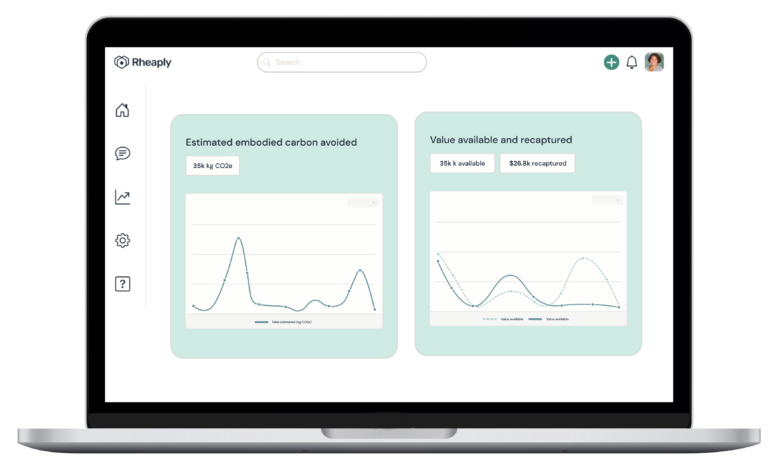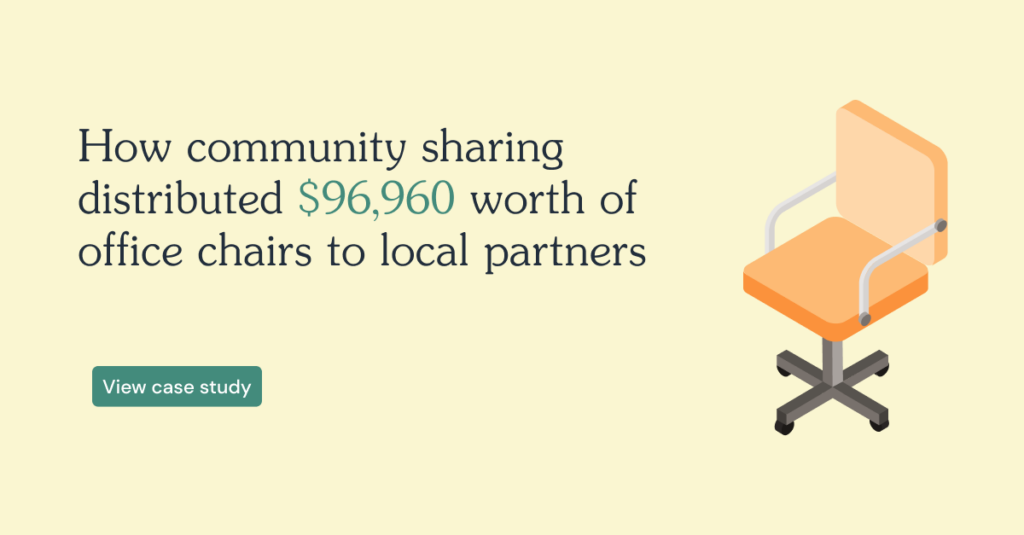Net Zero Strategies
Rheaply puts reuse on the table for every organization.
Net Zero Strategies
The simple, two-word phrase “net zero” refers to a broad and formidable strategy related to efforts by states, private companies, and nonprofits to limit or completely mitigate their contribution of harmful emissions into the Earth’s atmosphere. To be “net zero” means committing to investing in net zero strategies or means for emissions reductions – things like planting trees, transitioning away from fossil fuels to more renewable sources of energy, and even recapturing carbon dioxide directly from the air – so much so that any existing emissions are entirely offset.
As climate forecasts grow ever direr, more net zero companies are developing ways of achieving net zero waste with even greater urgency. While climate change may impact some industries more quickly and more heavily than others, the side effects and long-term effects of climate change will spare no industry. Rising sea levels and rising sea temperatures, for example, threaten not only the immediate coastline but all of the systems that rely on oceanic currents as well. Rising sea levels mean greater coastal erosion, and rising sea temperatures threaten fragile and biodiverse ecosystems, especially coral reefs, which cannot survive in warmer waters.
Net zero strategies seek to slow down the effects of climate change while providing new methodologies and more sustainable practices. Now there are numerous categories in which organizations are striving for net zero goals: net zero water, net zero carbon emissions, net zero waste to landfill, and more. Some companies have even adopted net zero 2030 goals to help streamline the transition process towards greener, more sustainable practices.
While net-zero strategies can provide some relief, they are not a silver bullet-type solution for all of the ails of climate change. However, the concept of net zero is growing in popularity, and more research and investments are being made into more affordable, practical net zero solutions and strategies that can provide companies with greener alternatives.

Net zero strategy for business
What does it take to execute a sound net zero strategy for business endeavors? If you’re a business owner looking up “how to achieve net zero emissions” or “how to achieve net zero emissions by 2050,” don’t fret. There are small-scale and large-scale actions you can take to put your organization on a path to net zero, whether your ultimate goal is complete net zero, net zero emissions, net zero waste, or something else. Even seemingly small or insignificant actions can be beneficial – whether it’s something like migrating to a paperless system or switching to using recycled paper when physical copies are necessary. Every effort matters.
“Net zero” means that any emissions your company does emit would need to be offset by your net-zero initiatives or strategies – this means that net zero emissions by 2030 is an achievable goal, even for smaller enterprises with fewer resources. One company by itself is not going to solve the climate crisis by achieving modest net zero objectives. However, collectively, if a majority of businesses and organizations commit to net-zero strategies and follow through on those strategies – that kind of collective action can make a real difference in helping to mitigate some of the damage of climate change.
The first step should be for an organization to take inventory of its present emissions footprint across all operations. A basic understanding of the baseline will provide organizations with a wealth of information to help develop reduction and net-zero strategies. Secondly, identify achievable targets or milestones and develop actionable plans that genuinely help to reduce emissions, pollution, and other adverse effects on the environment, employees, and consumers as well. Once you have your targets in sight, devise an accountability system to ensure that your net-zero strategies retain their focus and are completed on schedule or ahead of schedule if at all possible.
Benefits of net zero
According to the 2022 McKinsey Climate Change Report, virtually every industry in the world can expect some kind of disruption due to climate change or the effects thereof. Lengthening fire seasons and increased frequency and severity of forest and wildfires impact logging businesses, agricultural businesses, and even tourism. Increased frequency and severity of Atlantic hurricanes can wreak complete havoc on coastal communities and their local economies. The innumerable consequences of climate change powered by the overconsumption of fossil fuels and other unsustainable processes are still being researched; we don’t yet fully comprehend the extent of damage and suffering a changing climate will bring about.
That said, the benefits of net zero initiatives are numerous. Embracing science-based targets of net-zero strategies can be a great way to help shift the paradigm. When your company makes a serious, concerted effort to achieve net zero emission targets, not only does the company reap the benefits of achieving a goal, but the environment benefits as well. Employees benefit, knowing that their organization has contributed to sustainability initiatives and the health and longevity of the whole planet. Another benefit is that many consumers prefer to do business with companies that are actively involved in greener technologies.
The more companies and governments invest in net zero initiatives, the more net zero will be perceived as the standard. Organizations that wish to remain competitive in their respective markets will be making intelligent investments into net zero technology and establishing more sustainable practices. Shareholders will view investments in net zero initiatives as investments in the longevity and prosperity of the organization as well; more companies are adopting or developing climate-conscious pathways to greater success. Many companies that do not prioritize net zero initiatives, even in modest or conservative increments, may not be able to thrive in markets that are increasingly inundated with climate-conscious buyers and shareholders.
Net zero strategy summary
In a recent policy paper entitled “Net Zero Strategy: Build Back Greener,” published by the United Kingdom’s Department for Business, Energy & Industrial Strategy, the UK identifies several proposals for “decarbonizing” every sector of the economy to meet net-zero targets by 2050. A net zero strategy summary like this can be a helpful tool for companies hoping to transition to net zero cost-effectively.
To summarize the main points within this post, “net zero” is a phrase used to describe a company or organization’s overall contribution to the volume of carbon dioxide in the atmosphere. For example, a company with “net zero” carbon emissions may emit some carbon dioxide throughout its processes, but there are other systems within the process that offset or mitigate the harmful carbon emissions, resulting in a net gain of zero new emissions in the atmosphere.
While the short-term investments may be costly, and it may take time for some emissions offsets to come to fruition – like the planting of trees, as it can take a tree several decades to mature to the point where its carbon dioxide absorption is no longer negligible – these investments ultimately benefit local environments and ecosystems and contribute to the overall health of the whole planet.
We will not meet all of our net zero goals overnight, and we certainly cannot undo decades of harm caused by the unrestricted burning of fossil fuels, but committing to more sustainable net zero initiatives is an investment in a company’s survival and the survival of our planet and its hallowed biodiversity.


